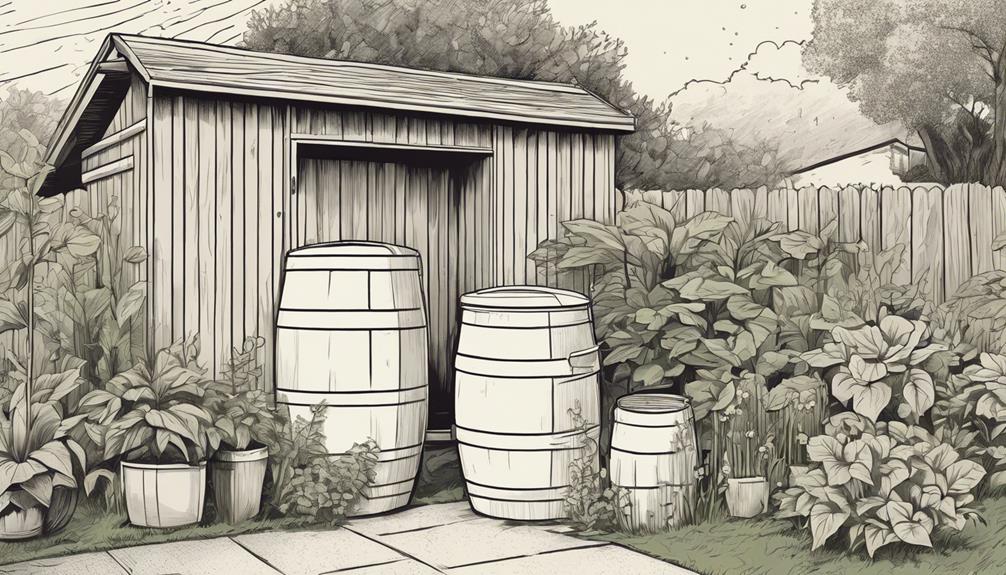See All: Backyard Farming
Free Backyard Farming Webinar…
You can grow food! This free webinar is for people who want the fastest and easiest ways to produce healthy and delicious vegetables, eggs, and meat. Because you know that growing your own food is like printing your own money…
Click Here To Watch The Free Webinar Now!
“I’ve recently started a backyard farm and want to make the most of the naturally occurring resources available. Rainwater seems like a great option for watering my plants and general use around the garden. However, I’m concerned about how to store it safely and effectively to ensure it’s clean and ready for use when needed. Can you provide detailed advice on the best practices for rainwater storage?” Thanks, Linda, Perth, Australia.
How Do I Store Rainwater Safely?
Rainwater can be a fantastic resource for your backyard farm, Linda. It’s environmentally friendly, helps reduce water costs, and provides plants with soft, chlorine-free water. However, the key is to store it properly so that it stays clean and usable. Here’s a comprehensive look into the best practices for storing rainwater safely.
Why Rainwater Harvesting is Beneficial
Collecting rainwater can help mitigate water scarcity, reduce flood risks, and lower your overall water expenses. Here are some more detailed benefits:
- Eco-Friendly: Reduces reliance on municipal water supplies and helps conserve natural water sources.
- Cost-Effective: Decreases your water bills and makes your home more self-sustainable.
- Better for Plants: Rainwater is free of chemicals like chlorine and fluorides, which are present in tap water and may not be ideal for some plants.
Choosing the Right Rainwater Storage System
It’s essential to pick a suitable storage system for your needs. Here are some options:
- Barrels: The simplest and most cost-effective rainwater collection. Choose food-grade barrels to avoid chemical contamination.
- Cisterns: Larger tanks often made of plastic, concrete, or metal. Ideal for storing larger volumes of water.
- Bladders: Flexible storage options that can be placed in tight or unique spaces.
Installation and Setup
Proper installation ensures that your system collects and retains clean water. Here’s how:
- Choose a Site: Place your storage near a downspout from your roof. Make sure the downspout leads directly into your collection system.
- Filtration: Install a first-flush device to direct the initial flow of dirty rainwater away from the barrel or tank. Add fine mesh screens to keep debris and insects out.
- Foundation: Ensure the barrel or tank sits on a sturdy foundation. A raised platform helps with gravity-fed flow.
Maintaining Clean Water
Keeping the stored water clean is crucial. Follow these steps:
- Regular Cleaning: Empty and scrub storage containers annually to prevent algae and sediment buildup.
- Check Filters and Screens: Inspect and clean filters and screens every few months for optimal performance.
- Treat Water: Use water treatment methods like UV lights, chlorination, or boiling for water you plan to use for drinking.
Preventing Contamination
Ensure your stored rainwater remains free from contaminants:
- Cover Storage: Always keep storage tanks closed or covered to prevent algae growth and contamination from animals or debris.
- Avoid Toxic Materials: Make sure your gutters, downspouts, and tanks are made from non-toxic materials.
- Runoff Sources: Divert rainwater from areas where it can pick up contaminants like bird droppings or chemicals.
Using Stored Rainwater
Utilize your stored rainwater effectively:
- Watering Plants: Rainwater is ideal for all types of plants, from vegetables and fruits to flowers and herbs.
- Household Use: With proper filtration and treatment, rainwater can be used for flushing toilets, washing clothes, and even drinking.
- Ponds and Water Features: Fill garden ponds and decorative features with collected rainwater.
Monitoring and Managing Rainwater Usage
Keep an eye on your rainwater usage to ensure it’s sustainable:
- Track Water Levels: Install a water level gauge to monitor your storage tank levels.
- Conservation Practices: Use water-saving irrigation methods like drip irrigation to make your rainwater supply last longer.
Legal Considerations
Before installing a rainwater harvesting system, check local regulations. Some areas have restrictions on the size and use of collected rainwater. In Perth, Australia, for instance, there are specific guidelines and rebates available for rainwater systems.
Tip: Contact your local municipality or water authority to understand the rules and take advantage of any incentives.
Community and Environmental Impact
Collecting rainwater not only benefits your backyard farm but also contributes positively to the community and environment by:
- Reducing Flooding: Helps lessen stormwater runoff that contributes to flooding and erosion.
- Decreasing Demand: Lowers your dependency on the municipal water supply, freeing up resources for others.
Final Thoughts…
Linda, storing rainwater safely is about more than just catching what falls from the sky. It’s about setting up the right system, keeping it clean, and using it wisely. By following these practices, you’re making a wonderful, sustainable choice for your backyard farm. Thanks for reaching out with your question, and happy farming!
Return To: Backyard Farming
Free Backyard Farming Webinar…
Marjory Wildcraft: For 20+ years, Marjory has been a leader in survival & preparedness and wants to show you how to grow food in your backyard farm. This free webinar is for people who want the fastest and easiest ways to produce healthy and delicious vegetables, eggs, and meat. Because you know that growing your own food is like printing your own money…

